Research Advice
Research in high school might be difficult to find, but it provides a unique opportunity to set yourself apart. Are you interested in discoveries, breakthroughs, and innovation? Or, are you simply looking for ways to push your education beyond the classroom walls? This article is for you. Empowerly held a webinar with a representative from Lumiere Education last week and we learned a lot. Your host, Sarah P., guided a discussion with Stephen Turban about why research is important and how you can step up. So, let’s dig in to some valuable high school research advice!
To get you up to speed…
The webinar covered:
- How to do research in high school with top university researchers.
- The benefits of research for admissions (and what to look for in a research mentor).
- Different topics of research, and how to pick your own research question.
- And of course, questions and answers from the live audience.
Note from the Empowerly team: If you’re interested in more information about the webinar, send our webinar host an email at <sarah@empowerly.com>. On the other hand, if you’re interested in signing up for future events Empowerly will hold, sign up for email updates from the blog. Doing so will keep your finger on the pulse of what’s new. We’re here to help you launch your best future now!
Background on your presenter
Stephen Turban is a co-founder of Lumiere Research Scholar Program, a Harvard College graduate, and a McKinsey & Company alum. Stephen founded Lumiere while he was a PhD student at Harvard Business School. His research has been covered in popular press journals such as the Economist, Harvard Business Review, BBC, Freakonomics Radio, and the Washington Post.
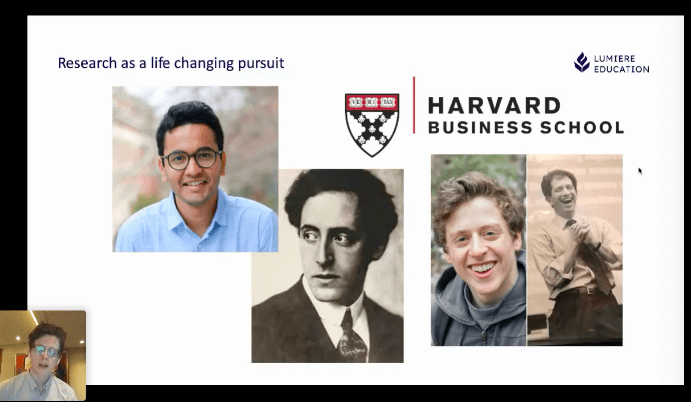
Why Stephen is passionate about research
Stephen actually met his co-founder at Harvard business school while pursuing his academic research. Further, met and was affected by important, influential mentors (see above). The Turban family also has a unique history of research influencing their life path. More broadly, Stephen noted how important research impacts not only your life and personal growth. It also impacts the external world to develop new technologies and societal innovations.
About Stephen’s current work:
Founded by Harvard alumni, the Lumiere Research Scholar Program helps high school students work one-on-one with a scholar on an independent research project. Lumiere research mentors come from top research universities like Stanford, Yale and Harvard. At the end of the program, students develop an independent research piece that could be used for college admissions or future studies.
Next, let’s get into the insights we learned at the webinar.
What exactly is research?
Stephen describes research as a fluid field. His definition is really any “learning under uncertainty.” So, if you’re naturally curious and independently motivated, it’s a great way to flex your skills.
He also noted that research in a traditional sense is actually available in many fields – so nearly any interest area can get involved! For example, you can conduct different kinds of research in subjects from Gender Studies to Computer Science. The subjects listed in the graphic below are all valid areas to conduct research.
Another example, close to Stephen’s own work: entrepreneurship! When you start a new venture, you are creating under uncertainty, so there is a lot of organic overlap.
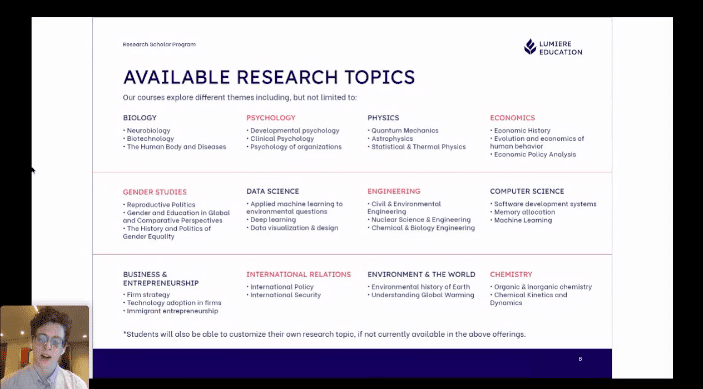
He continued, research is a valuable opportunity to learn something that has never been learned before (or learned incorrectly). If you’re ready to get started, find something you’re interested in answering, and pursue it! This passion led Stephen to start Lumiere, and provide high school research advice to passionate students.
Importantly, he also cautions research is a very iterative process. That means that you might not get it right the first time, but that’s okay. Keep investigating, exploring, and taking notes on the intellectual journey.
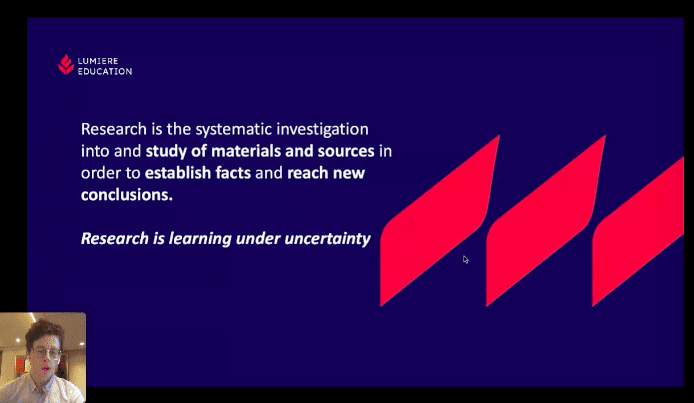

Why is research important to the world, and for college admissions?
Research allows students and academics (like you!) to learn about yourself. To be specific, you might learn what you enjoy studying. You could stumble upon some new senior thesis ideas when you get to college. Beyond that, you can start learning what a good next step in your career might be in a very hands-on way.
Research also pushes individuals to learn about the world, and potentially impact future study and developments. Whether your great breakthrough happens now or in undergraduate study, there’s always something new to learn. That is why taking this high school research advice forward into life can help you succeed, no matter where you go next.
On that note… For college admissions, conducting high quality research provides the opportunity to differentiate yourself from peers. Doing so, you can demonstrate your initiative and ambition and drive.
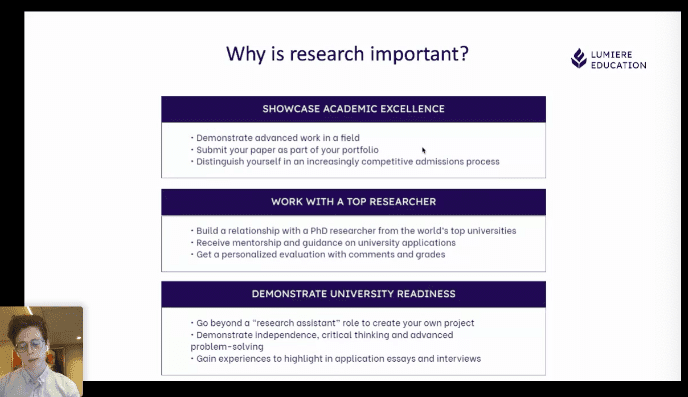
Looking for ways to get involved?
If you’re itching to start your own project, keep in mind: there are so many methodologies! For starters, you can pursue:
- Lab-based research
- Quantitative research
- Qualitative research
- or even Theoretical research.
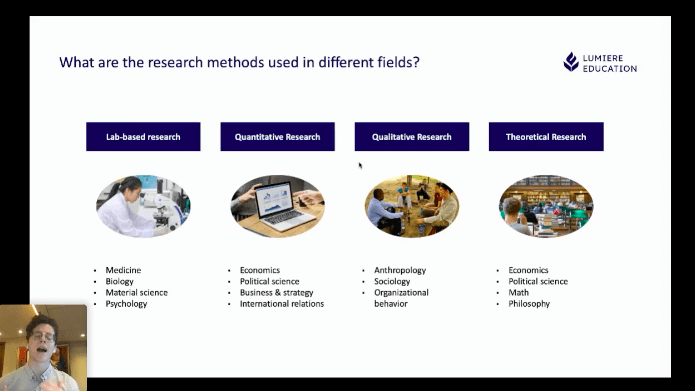
Find what you’re curious about and decide what method works best for you.
What to learn about what your pathway and mentorship could look like? Here are the three most common situations you can access as a high school student:
- Structured research programs: you apply and earn a place to gain access to resources.
- Research assistant work: you apply and gain experience working on an existing project.
- Individual independent research: done on your own, which is slightly more challenging, but open if other options aren’t available.
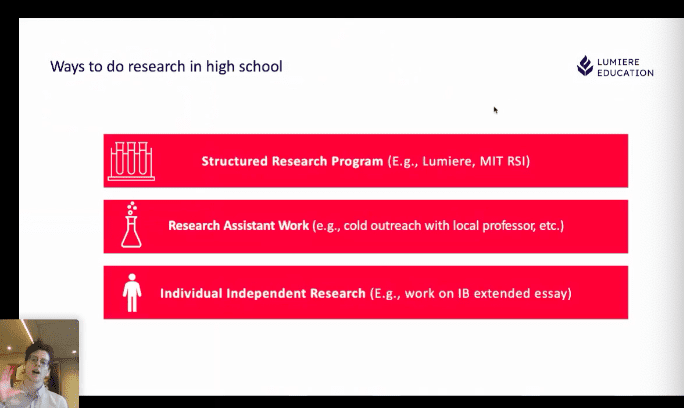
How to find a good mentor
Keep in mind: when you are searching for someone to help guide and advise your project, “shiny” names aren’t everything. This is a key piece of high school research advice — and beyond! What you do want is someone who is able to work at the top of the field. They will know what questions matter and deserve focused attention.
One-on-one access is best, when possible, to help you grow the most from your mentorship.
And here’s an underrated aspect of mentorship: find someone who can help you write well! This doesn’t have to be your project advisor, but look for someone who can also help with this. It will make sure your research paper and reporting is effective.
Finally, who makes a good candidate for research?
Some final tips to send you on your way to success:
- Don’t forget to be flexible and open-minded.
- Pursue what makes you passionate and motivated. Be specific about your interests.
- Do the legwork. Build foundational knowledge and hone your skills as much as possible.
- Find a strong, supportive mentor to learn from (and with).
- Put yourself out there and see if you can get your work published.
- Don’t get discouraged!
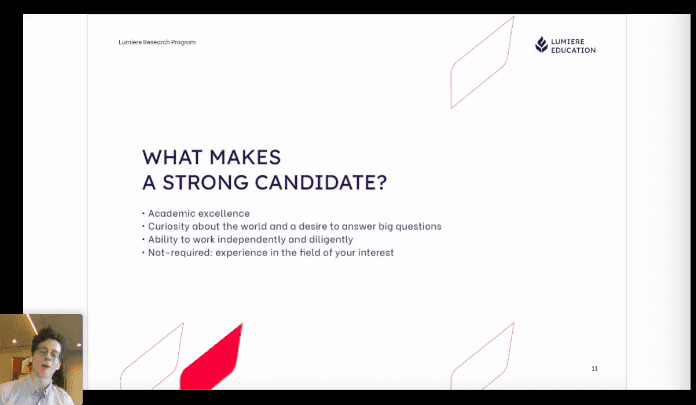
In conclusion
Finally, if you need more advice on how to stand out from the crowd in college admissions, reach out. The Empowerly team is here to help you in this process. We can provide support, writing help, and resources to get you started. From college lists to financial aid, the Empowerly community has you covered. Book a consult today.



